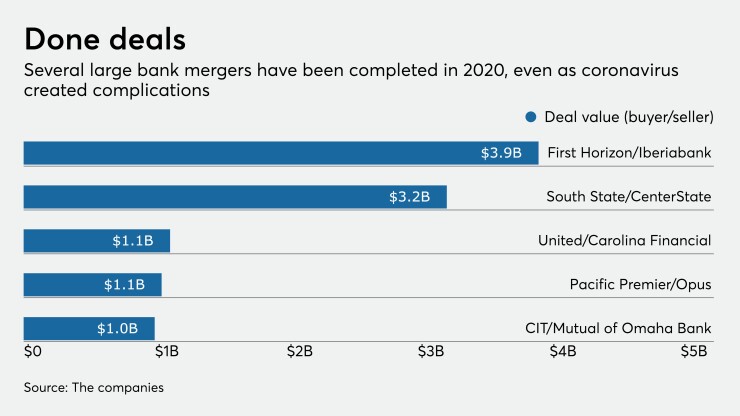First Horizon and Iberiabank
For Bryan Jordan, First Horizon's president and CEO, the pandemic validated the $3.9 billion merger, which closed on July 1, several weeks ahead of schedule, and created a nearly $80 billion-asset regional bank.
The plan is to eliminate nearly a tenth of operating expenses over the next 18 months, freeing up funds to reinvest in technological upgrades.
Those efforts have greater importance because of the pandemic, which has created uncertainty over credit quality and has accelerated use of digital platforms. Economic weakness and a series of emergency interest rate cuts by the Federal Reserve will likely pressure bank earnings for the foreseeable future.
“You have a two-faceted crisis — health and financial — so we do still have a long way to go,” Jordan said in a recent interview.

“First and foremost, it is important that we are positioned to meet the needs and demands of our customers in terms of delivering products and services, and that means the ability to make greater investments in technology and infrastructure,” he added.
Scale was the primary objective in November when First Horizon in Memphis, Tenn., and Iberiabank in Lafayette, La., agreed to the merger. The combined company, which kept the First Horizon name, has $58 billion in loans and $60 billion in deposits.
The companies would have been unable to wring out $170 million in expenses on their own, Jordan said. The merger “is clearly an opportunity to leverage two similar business models and achieve greater ability to make investments and deliver cost savings,” he added.
Many of the big decisions — choosing Memphis as the headquarters and selecting the management team — were already made when the pandemic hit and shelter-in-place orders made in-person meetings impossible.
Daryl Byrd, Iberiabank’s CEO, became executive chairman. William Losch III, First Horizon’s chief financial officer, kept that position, while Anthony Restel, Iberiabank’s CFO, is chief operating officer.
Advance planning allowed the companies to focus more on securing approvals from shareholders and regulators. Jordan said regulatory reviews remained on track largely because executives provided detailed integration plans well before the pandemic hit.
“We had spent four months building teamwork and culture, and our teams had already really come together,” Jordan said. “When the travel restrictions came on, we had already built the relationships across the organization. We were well positioned to move ahead and combine.”
Jordan said an in-depth credit review as part of the deal’s due diligence, including assumptions for an eventual recession, gave the management teams confidence to proceed when the pandemic created uncertainty in sectors such as hospitality, energy and health care. Still, each company conducted another review in light of the outbreak.
“We weren't preparing for a pandemic like this, but we did go into this merger planning for the possibility of a downturn at some point,” he said.
“We went in with a strong knowledge of the credit and risk profiles,” Jordan added. “When we got into the pandemic and started to review the credit portfolio we were already very confident in the strength of the underwriting.”
Both companies have also been active in the Paycheck Protection Program.
First Horizon has disclosed about 13,000 PPP loans totaling $2.1 billion, while Iberiabank has originated 8,300 loans for $1.8 billion. That could bring in more than $105 million in fees in coming quarters, based on the program’s median 3% rate.
As a bigger company, First Horizon will have more heft in key businesses as it looks to withstand the downturn and offset the pinch of

The fixed-income business “has proven over many years to be countercyclical in times like these,” Jordan said. “We have mortgage [warehouse lending] at First Horizon, and Iberia has a strong mortgage business that gives us more exposure at a time when demand is very strong.”
At the same time, demand for digital banking services has spiked since the pandemic struck.
First Horizon noted during a recent virtual conference that about 80% of its banking interactions were being handled remotely, versus about 50% before the outbreak.
But branches still have relevance, Jordan said, noting that First Horizon should complete its purchase of 30 locations in three states from Truist Financial later this month. That deal includes $2 billion in deposits that BB&T and SunTrust had to divest to secure approval for their merger.
The branches “are very important to us,” Jordan said. “They fill in the middle part of North Carolina — important markets — and we pick up some nice locations in Virginia and Georgia.”
The branch deal, originally expected to close in the second quarter, was delayed to avoid taking unnecessary risks.
“In March and early April, there was very little opportunity to communicate with new customers [and] a lot of the branches weren't open,” Jordan said.
“We had real questions about training, about how to make technology changes, all the things that have to be done with branch acquisitions,” he added. “We all agreed that it was important to the customers do defer to a time when we could do it right and not create more uncertainty.”
Uncertainty hangs over the near-term
“I think we’re in a place today where the economy is starting to show signs of recovery, and we’re starting to see some positive results” in employment reports, Jordan said. “But as a society, we have to place a priority on social distancing and wearing masks to keep the economy recovering.”
With new virus cases rising, Jordan said the pace of the recovery, and the severity of credit issues, remains difficult to gauge.
“We’re spending a tremendous amount of time looking in great detail at our loan portfolio, talking with our borrowers, providing support where we can,” he said. “I think we will get a better handle on the impact in the back half of 2020.”




